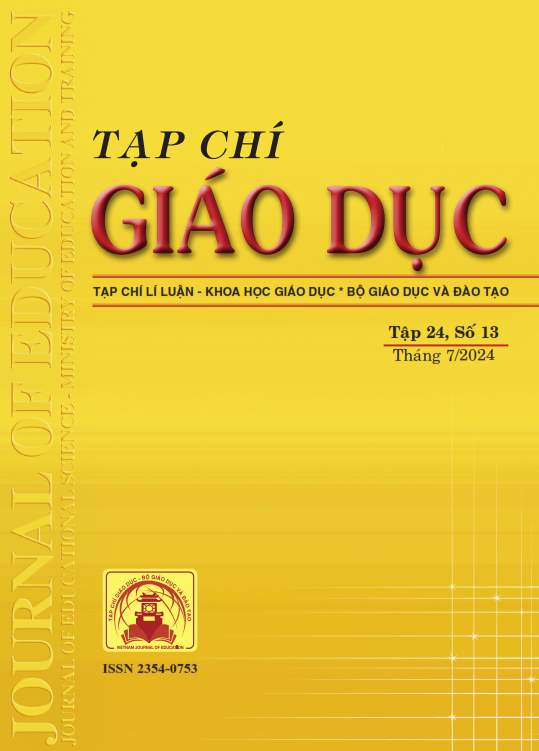Khảo sát quan niệm sai lầm về chủ đề “Công, năng lượng và công suất” của học sinh Việt Nam với bài kiểm tra ba bậc
Tóm tắt
Many studies worldwide have identified students’ common misconceptions when learning the topics “Work, energy, and power”; however, no research has pinpointed the misconceptions of Vietnamese students. Therefore, to investigate the misconceptions of Vietnamese students, our research team utilized a three-tier test while teaching the topic “Work, Energy, and Power”, which is the Work, Energy, and Power Concept Test (WPECT), developed and validated by Turkish educational experts. The objectives of this study are (1) To assess the validity of the WPECT in evaluating the misconceptions of Vietnamese students regarding the topic of “Work, Energy, and Power” and (2) To examine the misconceptions of Vietnamese students through the test. The WPECT test was administered to 199 students from 10 schools. The results indicate that the WPECT test is suitable with Vietnamese students, and Vietnamese students still hold certain misconceptions even after learning this topic in class. From a solution-oriented perspective, the research findings suggest that students who have been taught with STEM approaches tend to have fewer misconceptions.
Tài liệu tham khảo
Arslan, H. O., Cigdemoglu, C., & Moseley, C. (2012). A Three-Tier Diagnostic Test to Assess Pre-Service Teachers’ Misconceptions about Global Warming, Greenhouse Effect, Ozone Layer Depletion, and Acid Rain. International Journal of Science Education, 34(11), 1667-1686. https://doi.org/10.1080/09500693.2012.680618
Bộ GD-ĐT (2018). Chương trình giáo dục phổ thông môn Vật lí (ban hành kèm theo Thông tư số 32/2018/TT-BGDĐT ngày 26/12/2018).
Cataloglu, E. (2002). Development and Validation of an Achievement Test in Introductory Quantum Mechanics: the Quantum Mechanics Visualization Instrument (Qmvi). May, 196.
Gurel, D. K., Eryilmaz, A., & McDermott, L. C. (2015). A review and comparison of diagnostic instruments to identify students’ misconceptions in science. Eurasia Journal of Mathematics, Science and Technology Education, 11(5), 989-1008. https://doi.org/10.12973/eurasia.2015.1369a
Hestenes, D., & Halloun, I. (1995). Interpreting the force concept inventory: A response to March 1995 critique by Huffman and Heller. The Physics Teacher, 33(8), 502-502. https://doi.org/10.1119/1.2344278
Irmak, M., Inaltun, H., Ercan-Dursun, J., Yaniş-Kelleci, H., & Yürük, N. (2023). Development and Application of a Three-Tier Diagnostic Test to Assess Pre-service Science Teachers’ Understanding on Work-Power and Energy Concepts. International Journal of Science and Mathematics Education, 21(1), 159-185. https://doi.org/10.1007/s10763-021-10242-6
Kirbulut, Z. D., & Geban, O. (2014). Using three-tier diagnostic test to assess students’ misconceptions of states of matter. Eurasia Journal of Mathematics, Science and Technology Education, 10(5), 509-521. https://doi.org/10.12973/eurasia.2014.1128a
Peşman, H., & Eryilmaz, A. (2010). Development of a three-tier test to assess misconceptions about simple electric circuits. Journal of Educational Research, 103(3), 208-222. https://doi.org/10.1080/00220670903383002
Phạm Thị Phương Anh, Phan Đức Duy, Nguyễn Thị Diệu Phương (2023). Sử dụng bài kiểm tra chẩn đoán ba bậc để xác định các ngộ nhận của học sinh trong dạy học phần “Di truyền học” cấp trung học phổ thông. Tạp chí Giáo dục, 23(7), 24-29.
Plotz, T. (2017). Students’ conceptions of radiation and what to do about them. Physics Education, 52(1), 14004. https://doi.org/10.1088/1361-6552/52/1/014004
Saglam-Arslan, A. (2010). Cross-Grade comparison of students’ Understanding of energy concepts. Journal of Science Education and Technology, 19(3), 303-313. https://doi.org/10.1007/s10956-009-9201-3
Suprapto, N. (2020). Do We Experience Misconceptions?: An Ontological Review of Misconceptions in Science. Studies in Philosophy of Science and Education, 1(2), 50-55. https://doi.org/10.46627/sipose.v1i2.24
Taslidere, E. (2016). Development and use of a three-tier diagnostic test to assess high school students’ misconceptions about the photoelectric effect. Research in Science and Technological Education, 34(2), 164-186. https://doi.org/10.1080/02635143.2015.1124409
Treagust, D. (1986). Evaluating students’ misconceptions by means of diagnostic multiple choice items. Research in Science Education, 16(1), 199-207. https://doi.org/10.1007/BF02356835
Vosniadou, S., & Brewer, W. F. (1987). Theories of Knowledge Restructuring in Development. Review of Educational Research, 57(1), 51-67. https://doi.org/10.3102/00346543057001051
Warren, J. W. (1986). At what stage should energy be taught? Physics Education, 21(3), 154-156. https://doi.org/10.1088/0031-9120/21/3/307
Tải xuống
Đã Xuất bản
Cách trích dẫn
Số
Chuyên mục
Giấy phép

Tác phẩm này được cấp phép theo Ghi nhận tác giả của Creative Commons Giấy phép quốc tế 4.0 .












